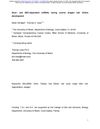 4 citations,
July 2022 in “Frontiers in Cell and Developmental Biology”
4 citations,
July 2022 in “Frontiers in Cell and Developmental Biology” The document concludes that understanding adult stem cells and their environments can help improve skin regeneration in the future.
 4 citations,
January 2022 in “The journal of investigative dermatology/Journal of investigative dermatology”
4 citations,
January 2022 in “The journal of investigative dermatology/Journal of investigative dermatology” A faulty KLHL24 gene leads to hair loss by damaging hair follicle stem cells.
 4 citations,
August 2021 in “Frontiers in Cell and Developmental Biology”
4 citations,
August 2021 in “Frontiers in Cell and Developmental Biology” Stress can cause hair loss by affecting nerve-related hair growth, and noradrenaline might help prevent this.
4 citations,
June 2021 in “Frontiers in Pharmacology” Bone marrow stem cells and their medium help hair regrowth.
 4 citations,
May 2018 in “Electronic Journal of Biotechnology”
4 citations,
May 2018 in “Electronic Journal of Biotechnology” All-trans retinoic acid at high doses harms goat hair growth cells and could be bad for hair growth.
 4 citations,
October 2016
4 citations,
October 2016 Herbs like aloe vera and amla are effective and safe for treating hair loss.
 4 citations,
February 2014 in “Proceedings of SPIE”
4 citations,
February 2014 in “Proceedings of SPIE” Low-Level Light Therapy is effective for skin rejuvenation, wound healing, and hair growth, with mild side effects.
4 citations,
January 2011 in “Cell stem cell” Hair follicle stem cells can return to their original niche and help regenerate hair.
 3 citations,
November 2023 in “Frontiers in cell and developmental biology”
3 citations,
November 2023 in “Frontiers in cell and developmental biology” Melanocytes are important for skin and hair color and protect the skin from UV damage.
3 citations,
July 2023 in “Frontiers in Aging” Hair follicle stem cells change states with age, affecting hair growth and aging.
 2 citations,
July 2022 in “Cell Regeneration”
2 citations,
July 2022 in “Cell Regeneration” Understanding hair growth involves complex factors, and more research is needed to improve treatments for hair loss conditions.
 2 citations,
March 2020 in “International Journal of Molecular Sciences”
2 citations,
March 2020 in “International Journal of Molecular Sciences” Topical treatments can deliver active molecules to skin stem cells, potentially helping treat skin and hair disorders, including skin cancers and hair loss.
 2 citations,
March 2013 in “Hair transplant forum international”
2 citations,
March 2013 in “Hair transplant forum international” Research on "hair cloning" for hair loss shows potential for hair thickening but has not yet achieved new hair growth in humans.
1 citations,
December 2023 in “Biomolecules” Regulating cell death in hair follicles can help prevent hair loss and promote hair growth.
 1 citations,
November 2023 in “iScience”
1 citations,
November 2023 in “iScience” A protein called desmoglein 3 is important for keeping hair follicle stem cells inactive and helps in their regeneration.
 1 citations,
September 2023 in “Journal of cosmetic dermatology”
1 citations,
September 2023 in “Journal of cosmetic dermatology” Silybum marianum flower extract may help increase hair growth and decrease hair loss.
1 citations,
January 2023 in “Science Advances” The skin's microbiome helps hair regrow by boosting certain cell signals and metabolism.
 1 citations,
October 2022 in “JCI insight”
1 citations,
October 2022 in “JCI insight” Deleting the BRD4 protein in certain skin cells causes hair loss and skin inflammation.
 1 citations,
October 2022 in “Annals of Translational Medicine”
1 citations,
October 2022 in “Annals of Translational Medicine” Cucurbitacin helps mice grow hair by blocking a protein that stops hair growth.
 1 citations,
August 2022 in “International Journal of Molecular Sciences”
1 citations,
August 2022 in “International Journal of Molecular Sciences” FGF12 is important for hair growth and could be targeted for hair loss treatment.
 1 citations,
June 2021 in “Biomolecules & Therapeutics”
1 citations,
June 2021 in “Biomolecules & Therapeutics” Activating δ-opioid receptors can help hair grow.
 1 citations,
January 2020 in “bioRxiv (Cold Spring Harbor Laboratory)”
1 citations,
January 2020 in “bioRxiv (Cold Spring Harbor Laboratory)” Dicer is crucial for hair growth in mice.
 1 citations,
May 2017 in “InTech eBooks”
1 citations,
May 2017 in “InTech eBooks” Hair loss in Androgenetic alopecia (AGA) is due to altered cell sensitivity to hormones, not increased hormone levels. Hair growth periods shorten over time, causing hair to become thinner and shorter. This is linked to miscommunication between cell pathways in hair follicles. There's also a change in gene expression related to blood vessels and cell growth in balding hair follicles. The exact molecular causes of AGA are still unclear.

Hair RiseTM microemulsion effectively promotes hair growth and treats hair loss better than standard treatments.
 October 2024 in “Experimental Dermatology”
October 2024 in “Experimental Dermatology” The belief about hair shedding phases is likely incorrect and needs reevaluation.
 July 2024 in “International Journal of Molecular Sciences”
July 2024 in “International Journal of Molecular Sciences” Hemp seed biomaterials may reduce hair loss and improve hair growth.
 July 2024 in “Clinical Cosmetic and Investigational Dermatology”
July 2024 in “Clinical Cosmetic and Investigational Dermatology” Exosomes can help promote hair growth and may treat hair loss.
 May 2024 in “Journal of Advanced Research”
May 2024 in “Journal of Advanced Research” Communication between blood vessel and hair follicle cells decreases with age, affecting hair growth and blood vessel formation.
 March 2024 in “IP Indian journal of clinical and experimental dermatology”
March 2024 in “IP Indian journal of clinical and experimental dermatology” Giant solitary trichoepithelioma is a rare, usually non-cancerous hair follicle tumor that can sometimes turn into skin cancer.
 February 2024 in “International Journal of Molecular Sciences”
February 2024 in “International Journal of Molecular Sciences” Hair loss in Androgenetic Alopecia is caused by genetics, aging, and lifestyle, leading to hair follicle shrinkage and related health risks.

























